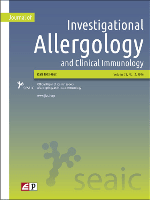
JOURNAL OF INVESTIGATIONAL ALLERGOLOGY AND CLINICAL IMMUNOLOGY
Scope & Guideline
Exploring the frontiers of Allergy and Clinical Immunology.
Introduction
Aims and Scopes
- Clinical Immunology Research:
The journal publishes studies exploring the immunological mechanisms underlying various allergic conditions, including food allergies, drug allergies, and immunodeficiencies. - Allergy Diagnostics and Management:
Research on diagnostic methods, including component-resolved diagnostics and innovative testing techniques, is a core focus, emphasizing practical applications in clinical settings. - Therapeutic Advances in Allergology:
The journal highlights advancements in treatment protocols, particularly the use of biologic therapies and desensitization strategies for severe allergic reactions and asthma. - Epidemiology of Allergic Diseases:
Epidemiological studies that assess the prevalence, risk factors, and impact of allergic diseases in different populations are frequently featured. - Patient-Centered Allergy Care:
The journal emphasizes the importance of personalized medicine and patient-centered approaches in managing allergic conditions, incorporating real-life experiences and outcomes.
Trending and Emerging
- Biologic Therapies for Asthma and Allergies:
There is an increasing focus on the efficacy and safety of biologic treatments for severe asthma and allergic conditions, with numerous studies reporting real-world outcomes. - Food Allergies and Sensitization Mechanisms:
Research on food allergies, particularly mechanisms of sensitization and novel allergens, has gained prominence, reflecting rising public health concerns. - Telemedicine in Allergy Care:
The integration of telehealth strategies in allergy management has emerged as a significant theme, particularly in the context of the COVID-19 pandemic, highlighting the need for innovative patient care solutions. - Impact of Environmental Factors on Allergic Diseases:
Studies examining the role of environmental factors, such as pollution and climate change, on the prevalence and severity of allergic diseases are increasingly prevalent. - Immunological Profiles and Biomarkers in Allergic Conditions:
Emerging research is focusing on the identification of immunological biomarkers and phenotyping of patients to tailor treatment approaches effectively.
Declining or Waning
- Occupational Allergies:
Publications related to occupational asthma and allergies have become less frequent, possibly due to a shift in focus towards more prevalent and impactful conditions such as food allergies and asthma management. - Traditional Allergen Immunotherapy:
Research on conventional allergen immunotherapy methods is declining as interest increases in more novel therapies and personalized approaches, such as biologics. - Historical Case Studies:
The journal has seen a decrease in the publication of retrospective case studies and historical analyses, shifting towards more forward-looking research that informs current clinical practices.
Similar Journals
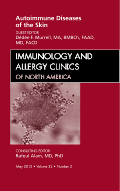
IMMUNOLOGY AND ALLERGY CLINICS OF NORTH AMERICA
Fostering Excellence in Immunological ResearchIMMUNOLOGY AND ALLERGY CLINICS OF NORTH AMERICA is a premier journal published by W B SAUNDERS CO-ELSEVIER INC, focusing on the dynamic fields of immunology and allergy. With an ISSN of 0889-8561 and an E-ISSN of 1557-8607, this journal has consistently ranked in the Q2 category in both Immunology and Immunology and Allergy as per 2023 metrics, underscoring its critical role in academia. It provides cutting-edge research, comprehensive reviews, and practical insights that cater to the needs of researchers, clinicians, and students alike. Though the journal is not open access, it remains an essential resource for those involved in advancing knowledge and clinical practice in allergy and immunology. With its converged years stretching from 1987 to 2024, the journal serves as a rich repository of scientific advancements, fostering progress in diagnosis, treatment, and prevention of allergic diseases and immune disorders. Positioned within the United States and based in Philadelphia, it plays a vital role in promoting scholarly communication within these impactful fields.

Therapeutic Advances in Allergy and Rhinology
Innovating therapeutic solutions for allergic conditions.Therapeutic Advances in Allergy and Rhinology, published by SAGE Publications Inc, is an esteemed journal that focuses on advancing the fields of allergy and rhinology through innovative and impactful research. As an Open Access journal, it provides a platform for researchers, clinicians, and students to share significant findings and therapeutic developments aimed at improving patient outcomes related to allergic conditions and nasal disorders. The journal aims to publish high-quality peer-reviewed articles, reviews, and case studies that contribute to a deeper understanding of the pathophysiology and management of allergies and rhinological conditions. By fostering collaborative dialogue across various disciplines, Therapeutic Advances in Allergy and Rhinology plays a crucial role in enhancing clinical practice and guiding future research in this vital area of health. With an ISSN of 2753-4030, the journal continues to establish itself as a key resource for anyone involved in allergy and rhinology research and practice.
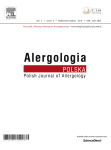
Alergologia Polska-Polish Journal of Allergology
Empowering the allergic community with open access knowledge.Alergologia Polska - Polish Journal of Allergology, published by TERMEDIA PUBLISHING HOUSE LTD, is a distinguished academic journal dedicated to advancing the field of allergy research and treatment. With the ISSN 2353-3854, this journal serves as an essential resource for professionals, researchers, and students alike, offering a platform for the dissemination of novel findings and comprehensive reviews in allergic diseases. The journal emphasizes open access to ensure widespread availability and engagement within the scientific community. Alergologia Polska aims to enhance the understanding of allergy mechanisms, diagnostics, and management strategies, fostering collaboration and innovation among experts in the field. Set against the vibrant backdrop of Poznań, Poland, this publication not only highlights clinical and experimental research but also promotes interdisciplinary discussions that are pivotal for tackling complex allergic conditions globally.

Journal of Cutaneous Immunology and Allergy
Exploring the frontiers of dermatological and immunological research.The Journal of Cutaneous Immunology and Allergy, published by FRONTIERS MEDIA SA in Switzerland, is an esteemed Open Access platform dedicated to advancing research in the intersecting fields of dermatology, immunology, and allergy. Since its inception in 2018, this journal has provided a vital resource for the dissemination of innovative research findings and critical reviews, enhancing our understanding of cutaneous conditions related to immune responses. Although currently classified in the Q4 quartile in both Dermatology and Immunology & Allergy categories as of 2023, the journal continues to strive for recognition within the scientific community, encouraging collaboration and knowledge sharing among researchers, clinicians, and experts. The journal boasts an E-ISSN of 2574-4593 and is committed to making high-quality research freely accessible to all, thus fostering greater insights into the complexities of skin-related immune disorders. Join us in this journey to explore the forefront of cutaneous research and contribute to the evolving dialogue in this dynamic field.
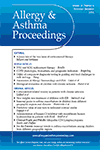
ALLERGY AND ASTHMA PROCEEDINGS
Empowering professionals with cutting-edge research.ALLERGY AND ASTHMA PROCEEDINGS, published by Ocean Side Publications Inc, is a vital resource in the fields of Immunology, Allergy, and Pulmonary Medicine. With an impressive trajectory of publication from 1996 to 2024, this journal serves as a platform for cutting-edge research and advancements in the understanding of allergic and asthmatic conditions. Positioned in the Q3 quartile for Immunology and Allergy and Q2 for both Medicine (miscellaneous) and Pulmonary Medicine, the journal exhibits a robust impact within the academic community, boasting Scopus rankings that reflect its significance. The journal offers open access options, allowing for the dissemination of critical findings to a wider audience. Aimed at researchers, healthcare professionals, and students alike, ALLERGY AND ASTHMA PROCEEDINGS addresses the complexities of respiratory diseases and facilitates the sharing of knowledge that is essential to improving patient care and outcomes.

Postepy Dermatologii i Alergologii
Connecting researchers for a healthier tomorrow.Postepy Dermatologii i Alergologii is a distinguished Open Access journal published by TERMEDIA PUBLISHING HOUSE LTD, dedicated to advancing the fields of Dermatology and Immunology and Allergy. Since its inception in 2003, this journal has served as a vital platform for researchers and practitioners alike, promoting knowledge sharing and collaboration in Poland and beyond. With a current impact ranking placing it in the Q3 quartile for both Dermatology and Immunology and Allergy categories, it plays a significant role in contributing to academic discourse within these fields. The journal is indexed in Scopus, with respectable rankings reflecting its relevance and quality—#65/142 in Dermatology and #163/233 in Immunology and Allergy. Researchers are encouraged to explore a vast array of innovative studies and reviews, making it an essential resource for anyone seeking to stay at the forefront of dermatological and allergic research. For those interested in discovering groundbreaking findings and contributing to the ongoing dialogue in these disciplines, Postepy Dermatologii i Alergologii offers not only free accessibility but also a commitment to scholarly excellence.

Alergia Astma Immunologia
Advancing knowledge in allergy and respiratory health.Alergia Astma Immunologia is a dedicated journal focusing on the interdisciplinary fields of immunology and respiratory medicine, published by the Asthma and Allergy Patients Support Organization in Poland. With a commitment to advancing research and sharing knowledge, this journal serves as a platform for scholars and practitioners to discuss critical issues and recent advances in allergy, asthma, and immunological disorders. Despite being in Category Quartiles Q4 for both Immunology and Allergy and Pulmonary and Respiratory Medicine, its importance is highlighted by its continuous publication since 2000, providing a historical perspective on evolving scientific insights. Researchers and clinicians alike benefit from accessing novel findings and case studies that contribute to improved patient outcomes and innovative therapeutic strategies. While the journal currently offers limited open access, its commitment to providing high-quality, peer-reviewed content ensures its relevance in the academic discourse within these vital areas of health science. The journal aims to foster collaboration, stimulate research interest, and promote evidence-based practices within the professional community.

Current Treatment Options in Allergy
Empowering Practitioners with Cutting-Edge FindingsCurrent Treatment Options in Allergy is an esteemed academic journal published by SpringerNature, focusing on a critical area of health science: the evolving landscape of allergy treatments. With an E-ISSN of 2196-3053, this journal aims to provide a comprehensive platform for researchers and practitioners in the fields of Immunology and Allergy and Medicine. It has garnered recognition in the academic community, reflecting its significant contribution with a Q3 ranking in Immunology and Allergy and a Q3 ranking in Medicine as of 2023. The journal is based in Switzerland and encompasses research spanning from 2014 to 2024, ensuring that the latest findings and treatment options are available to professionals and students alike. With a growing focus on open access, it aims to make critical allergy treatment research widely accessible, thus fostering innovation and collaboration in this vital health sector. As the prevalence of allergies continues to rise globally, Current Treatment Options in Allergy plays a crucial role in disseminating important research and treatment strategies to improve patient outcomes.

Current Allergy & Clinical Immunology
Unlocking insights for a healthier tomorrow.Current Allergy & Clinical Immunology is a vital peer-reviewed journal published by the Allergy Society of South Africa, focused on advancing the field of immunology and allergy medicine. With an ISSN of 1609-3607, this journal offers crucial insights and research findings pertinent to the understanding and treatment of allergic conditions. Operating from South Africa, it features contributions from a diverse range of authors and professionals in the field. Published from 2008 to 2024, the journal plays an essential role in disseminating current knowledge, even as it holds a Q4 ranking in Immunology and Allergy and is positioned at the 4th percentile based on Scopus rankings. While not open access, it remains an important resource for researchers, practitioners, and students looking to stay informed on emerging trends and breakthroughs in allergy and clinical immunology.
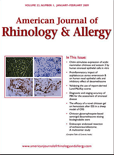
American Journal of Rhinology & Allergy
Advancing knowledge in rhinology and allergy research.Welcome to the American Journal of Rhinology & Allergy, a leading publication in the fields of otolaryngology and immunology, published by SAGE Publications Inc. Since its inception in 2009, this journal has played a pivotal role in disseminating cutting-edge research and reviews, addressing critical topics related to sinus disease, allergic disorders, and respiratory health. With an impressive Scopus ranking that places it in the top quartiles of both immunology and medicine, the journal garners about a 90th percentile ranking in otorhinolaryngology, reflecting its significance in advancing medical knowledge and clinical practice. The American Journal of Rhinology & Allergy aims to bridge the gap between laboratory research and clinical application, providing a platform for researchers and professionals to explore innovative therapies and treatment protocols. Access options include traditional subscription models to ensure comprehensive support for the academic community. Join our efforts to enhance understanding and treatment in the critical area of rhinology and allergy.